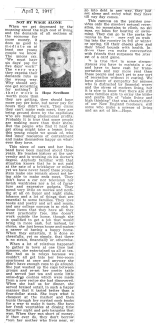When we get depressed by the moaning about the high cost of living and the demands of all sections of the economy for more money, it does us good to meditate on at one young couple we know. The unions cry, "We must have six days' pay for five days' work!" The very way they express their demands rubs us the wrong way. Why should anyone get something for nothing? If their work is worth more than they are getting, they should have more pay per hour, but never pay for hours they didn't work. They claim they can't make ends meet, they are being ground down by the capitalists who are making phenomenal profits. Probably it is true that some people are making more than their share. But the people who find it hard to get along might take a lesson from this young couple we speak of, who find inner resources of contentment and make themselves happy on whatever they have.
This niece of ours and her husband have been married about three years. He teaches history at the university and is working on his doctor's degree. Anybody familiar with that situation knows that he is not paid at the rate of a bricklayer or miner, yet we have never heard these youngsters make one remark about not being able to make ends meet. They don't have a car nor television nor lavish wardrobes nor a lot of furniture and expensive gadgets. They spend very little on movies and nothing at all on liquor and night clubs, tobacco and a lot of things that are essential to some familes. They love books and poetry and art and music, and any college campus is so rich in those items that they have all they want practically free. She doesn't work outside the home, though she is qualified to get a job that would bring in more cash, but instead, by choice, she just keeps house and makes a career of having a happy home. When they entertain, it is done so cheerfully, yet so simply, that there is no strain, financially or otherwise.
When a lot of relatives happened to gather in town at one time last summer, she entertained us all at tea. She had us in relays because we couldn't all get into her two-room apartment at once and anyway she didn't have enough cups to go around. She just washed up the cups between groups and re-set her pretty table and served just tea and some little anise-drop cookies which were made from a new recipe she had discovered. When she had us for dinner, she served braised oxtail, in such a happy manner that it tasted better than a four-dollar steak. She buys what is cheapest at the market and then hunts through her myriad cook books for a way to make it tasty. She buys her fresh vegetables at closing time Saturday night and gets bargains that way. When they run short of money, if they ever do, they don't borrow from her mother who lives near, or go into debt in any way, they just get along and enjoy what they have till pay day comes.
This campus on the prairies provides only the simplest natural recreation, no mountains to climb, no ski runs, no lakes for boating or swimming. They can go to the parks for picnics in the summer and go walking in the country in fall or winter or spring, till their cheeks glow and their blood bounds with health. Indoors they can make conversation with friends that surpasses the interest of a card game.
It is true that in some circumstances you have to maintain a car and have to have cash for transportation and pay more rent than these people and can't get to any sort of recreation without it costing. We have plenty of sympathy for anyone who is distracted by financial worry and the stress of modern living, but it is nice to know that there are still some families able to enjoy the blithe and gentle life of "plain living and high thinking" that was characteristic of our New England forebears, still some who make a science of living and an art of life. -- Hope.

